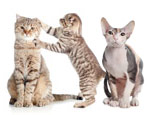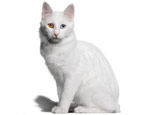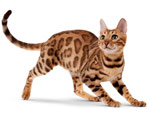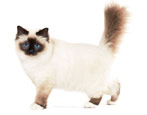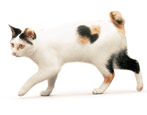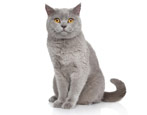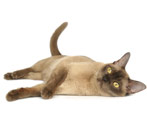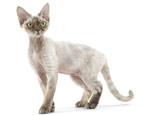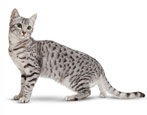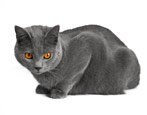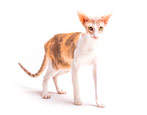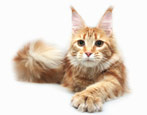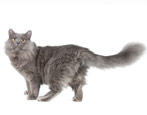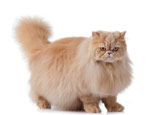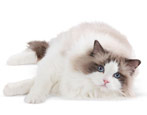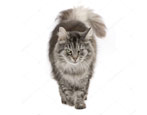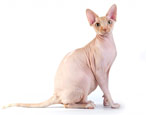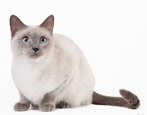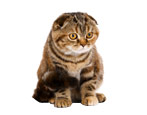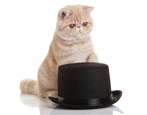Features of the character of British cats
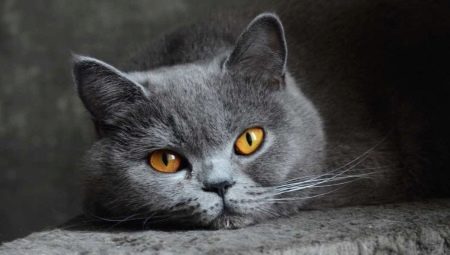
British cats, fanned by numerous legends, are the favorites of many people. You will find a description of these graceful animals, their habits, character and recommendations for raising in this article.

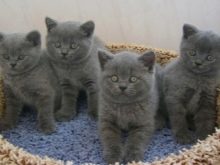
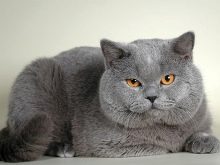
Description
There is no doubt that the writer L. Carroll described the British cat in his world famous book "Alice in Wonderland". If you see next to a graceful animal with a velvet coat, an attractive look and a sweet and gentle smile, then you are a true Briton.
This cat breed gained worldwide popularity in the XX century. There are 2 types of British known:
- British shorthair cat (British Shorthair);
- British Longhair (British Longhair).
Many believe that there are British Fold cats, but this is not so. There is no such breed by accepted international standards, so do not confuse it with the Scottish Fold.
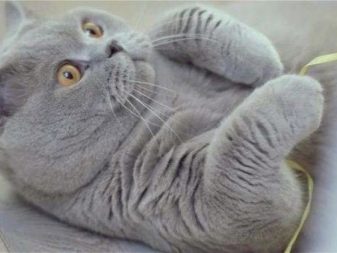
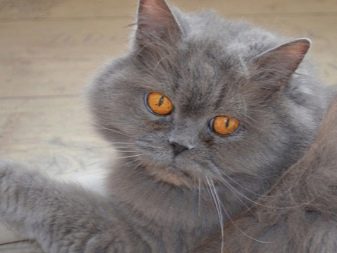
Shorthaired
The constitution of this animal is squat and powerful: a broad and muscular chest, back, shoulders, strong and strong legs. The weight of an adult animal can reach 8 kg. Despite the "wrestling" physique, the appearance of the British cat is aristocratic. The animal has a graceful neck and a round, regular head with lovely cheeks and a famous mysterious smile.
Her eyes are large, round, bright yellow, orange or deep green.
Cats with a clearly defined eye color, without various dashes and dots on the iris are appreciated.
British Shorthair cats are straight-eared. The rounded ears of the animal are located not on the top of the head, but far from each other, and are covered with a soft six.The nose of cats is short, wide, there is a barely noticeable dimple on the bridge of the nose - a sign of a purebred breed. A healthy and purebred animal should not have a curvature of the nose either.
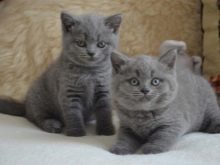

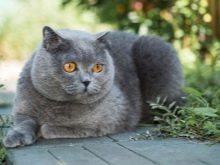
Longhaired
The British Longhair cat differs from its shorthaired relative only in the length of its coat. In our usual understanding, the wool of the representatives of this breed is far from the longest. The pile is of medium length, which gradually increases from the upper body to the tail of the animal.
Like the short-haired British cat, the long-haired cat's coat is soft, velvety with a very thick undercoat, pleasant to the touch. Taking care of such a cat is not difficult at all compared to the Persian breed. The ostins of the animal's fur never fall into tangles, the fight against which requires a lot of effort.
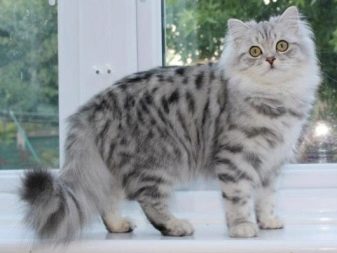
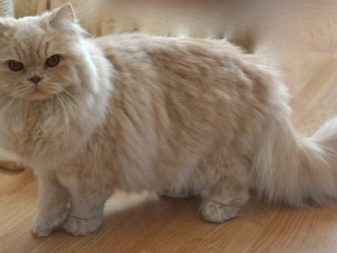
Color
Initially, the world community of lovers of these wonderful animals recognized only blue cats as true British. Over time, everything changed. The color range of their coat is very rich.
Popular options:
- traditional blue,
- aristocratic purple;
- snow-white without the slightest hint of yellowness;
- magic black;
- gourmet chocolate;
- very rare brown - cinnamon;
- rare faun;
- beautiful silver;
- no less spectacular gold;
- "Whiskas" with delicate thin dark stripes on a light silver background (British women of this color became the stars of television screens, starring in an advertisement for the cat food of the same name);
- exquisite tortoiseshell, most often characteristic of kitties;
- color point, very reminiscent of the color of Siamese cats;
- motley tabby with tiger-like patterns;
- harlequin is a two-tone color with a maximum proportion of white, just like the bio-color.
Fans of this breed hold an exotic color that resembles chinchilla fur.
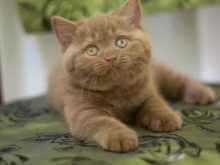
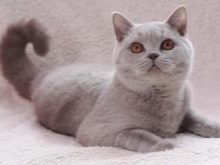
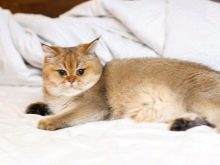
What is the nature of cats?
A cat that walks by itself is the most faithful characteristic of the temperament of the representatives of this breed. The British are independent and proud animals, true English aristocrats. They do not like fuss and noise around them, obsessive attention and excessive affection.
It is impossible to caress a British cat without her desire; she will sit on the owner's lap only on her own initiative.
Despite such a wayward nature, the cat has a lot of advantages for which it is appreciated and loved by breeders.
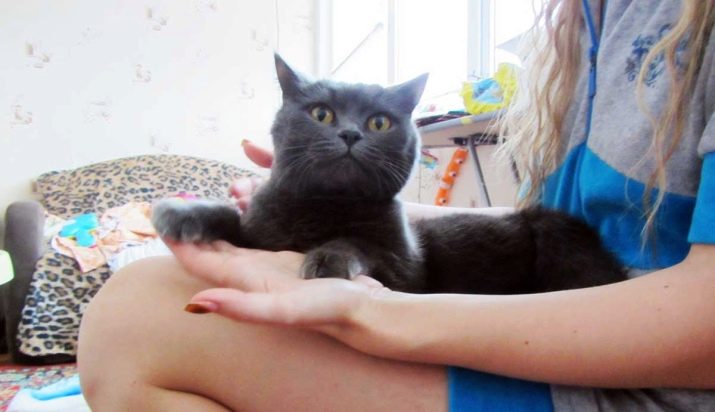
Devotion
The animal is distinguished by great devotion and love for its owners. During separation from loved ones, cats may not show this and behave as usual, but the long-awaited meeting will be stormy and joyful.
For this, the British are called companion cats. In English, they are restrained in emotions, but kind and loving in their hearts.
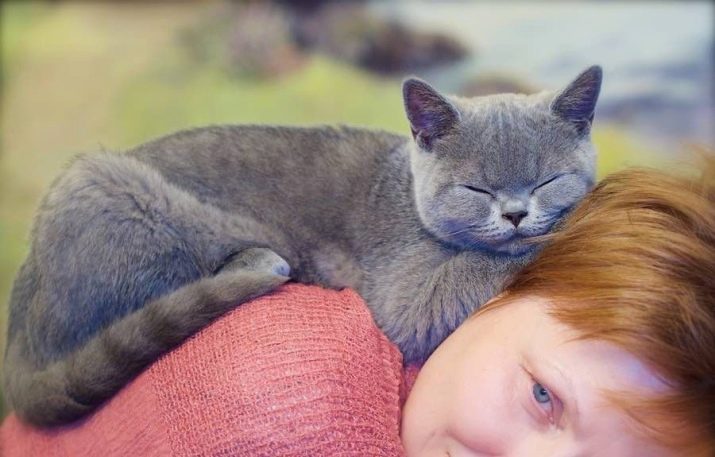
Patience
Patience is one of the main advantages of these cats. They may not allow much in relation to themselves, but they know how to endure for a long time and stubbornly. The British are very tolerant of young children, especially the long-haired British. No matter how the "little tormentors" scoff at the animal, it will steadfastly endure all the tricks of the kids.
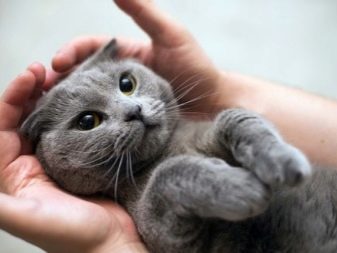

Friendliness
These animals are distinguished by their friendliness to others, avoid conflicts, quarrels with household members and their fellows. They will gladly take part in children's games, they are very peaceful towards dogs, they will never touch a bird, a hamster or a fish living in the house.
British women calmly treat strangers, do not have the habit of suddenly attacking guests, showing aggression. If the cat does not like the guest, she will rather express by her appearance complete indifference to him, but will not show displeasure with the visitor.
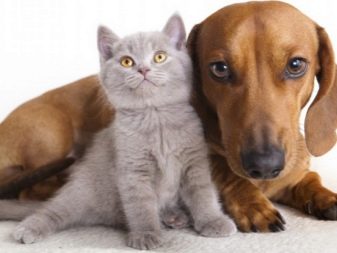
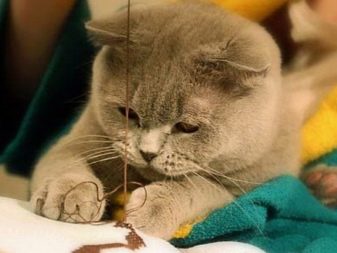
Cleanliness
Cats quickly learn to order, learn to walk on the litter box without any problems and do not make mistakes. A cat can "noshkodit" past in order to express its indignation for some reason. Kittens living with their mother also quickly learn to order, adopting good habits from her.
Remember - in order for an animal to behave with dignity and not upset you with its behavior, you need to educate it from infancy.
The cat will quickly understand "what is good and what is bad." If the kitten gets used to doing what you do not like, it will be difficult to wean him from bad manners: the British are very stubborn.
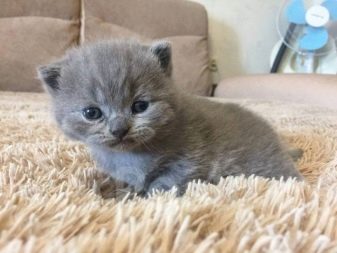
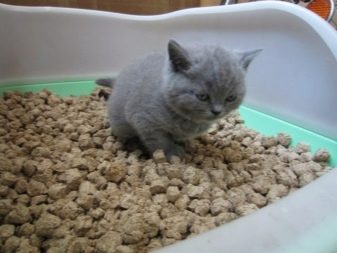
Stubbornness
Stubbornness is one of the qualities that does not please the owners. If the cat is unhappy, does not want to do what you ask, you will not be able to get anything out of it. In response, the animal may be offended and angry, refuse to eat and not want to communicate with you.
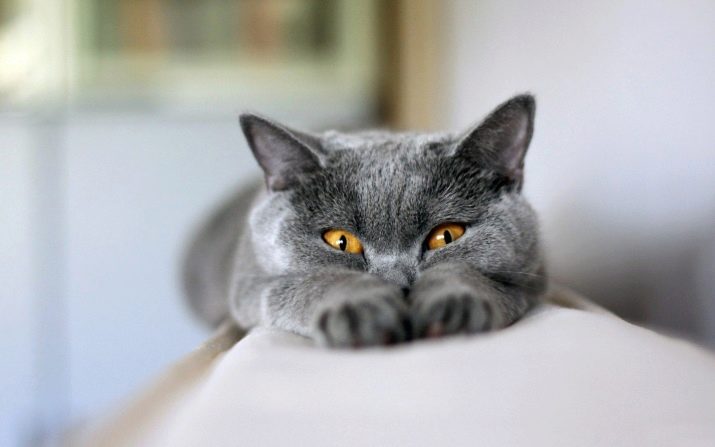
Rancor
The British cat remembers the offense for a long time. You will already forget about the quarrel, and the animal remembers this and seizes the moment to "take revenge" on you. The best way out is to solve all problems with kindness and affection.
British girls are considered less vindictive and more affectionate than boys. They are more playful and outgoing. British boys are very attached to their family, and they do not welcome strangers in the house and can express their dissatisfaction.
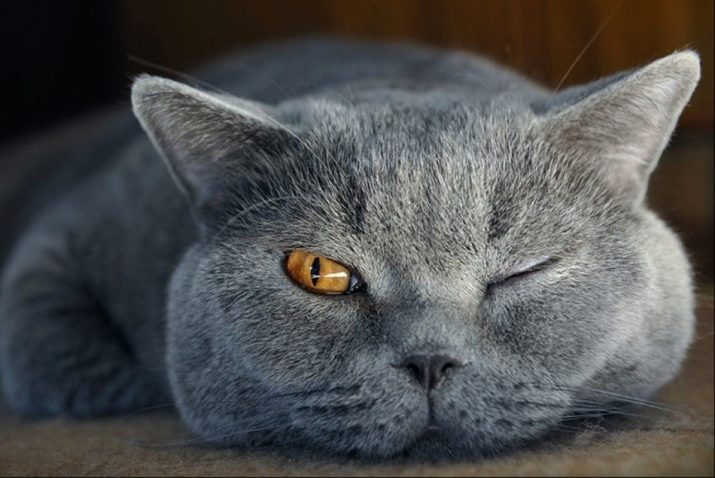
Behavior
If you think that "British aristocrats" are arrogant and clumsy, you are deeply mistaken. The behavior of this breed often depends on their mood. If the cat is healthy, it is active and cheerful, loves to communicate with others, sit in its arms, caress and play.
The British love and sleep well. Sometimes the cat is inaudible and not visible for 20 hours. The owners are thrown off their feet in search of the missing pet, but in fact their treasure is sleeping somewhere in a quiet secluded place where no one bothers him.
The British can sleep anywhere:
- on top of the wardrobes;
- on the upper shelves of the racks;
- climb into hard-to-reach places under sofas, armchairs, on the mezzanine;
- in boxes and suitcases if they are open;
- in the oven or in the drum of the washing machine, if you can get into them.
Given this unique feature of animals, be careful to keep your pet safe.
The British feel like they are the masters of the house. They move freely around the apartment, moving from room to room, so it is better to keep all the doors open so that the animal does not get nervous and you don’t worry.
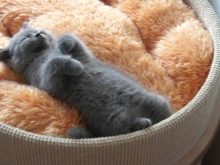
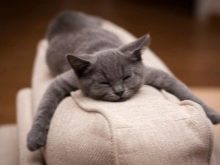

The cat is a full member of the family. He perfectly feels the psychological environment in the house. If a conflict has matured between household members, family members quarrel with each other and scandal, this will affect the behavior of the animal.
The Briton will start to get nervous, may hide or, conversely, protest in any possible way.... If your cat doesn’t have the habit of “dirtying” past the litter box, he may do so by expressing resentment about family strife.
Pets of this breed do not tend to make a commotion, they are almost silent, they rarely meow, mostly only during the mating season. However, there are cats of this breed who like to “talk” with their owners: to meow if they are hungry, want attention or complain about something.
British women devote a lot of time to guiding the marathon: cleanliness is one of the good habits of these cats.
Washing and licking a cat is not only a hygiene procedure, but also a way to relieve stress. Having experienced unpleasant emotions, the animal begins to shine and so gradually calms down.
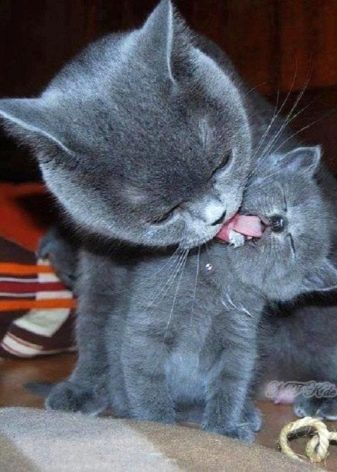
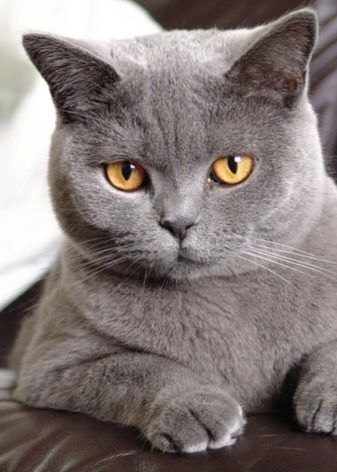
Young cats are more active than animals over 5 years old. They are more sedate and calm. The behavior of females before childbirth changes significantly. They become more affectionate, want participation and sympathy, and ask to scratch and stroke their tummy.
If the animal is worried and does not find a place for itself, then it is time for the kittens to be born.
Help the animal:
- find a spacious box for the "maternity hospital" and cover it with disposable diapers;
- Provide the cat with a cozy, draft-free secluded place and be close to the animal if it wants to;
- if your pet has chosen a place for childbirth on her own, transfer the box there and help her get comfortable;
- after the birth of kittens, change the soiled diaper;
- put water and a favorite treat in an accessible place for the cat;
- be sure to praise and pet the animal.
British cats are good mums. From the first minutes of birth, they begin to take care of the babies, leaving them only when urgently needed.
If the cat is young and inexperienced, let her know that raising kittens is now her main concern. Praise the animal when it licks and feeds the babies, but do not scold if it does not understand what is required of it. You can only achieve results by persuasion and affection.
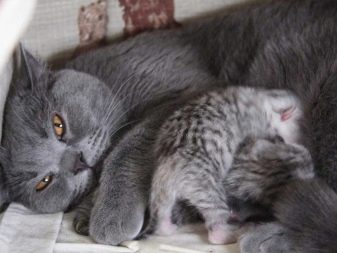
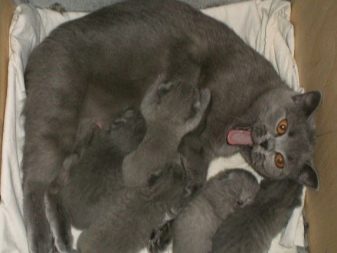
How to educate correctly?
If you purchased a kitten that is already litter and scratching post accustomed, you are very lucky. The kid will not misbehave: walls, furniture and curtains will remain in perfect order.
A kitten that does not know the rules of good manners, you will have to educate yourself from "young claws":
- introduce the kitten to the house and its inhabitants;
- show him his toilet and sleeping place;
- bring it to the scratching point, which is better to purchase in advance, or immediately after the kitten arrives at your house.
If you do not want the baby to climb on your bed, table, eat your favorite flowers on the window and do not go to the toilet where it is not supposed to, you should scold the kitten, finding it at the crime scene.
It is absolutely useless to punish an animal after you have discovered the "result" of its activity.
The cat will not understand why he received a slap in the face.
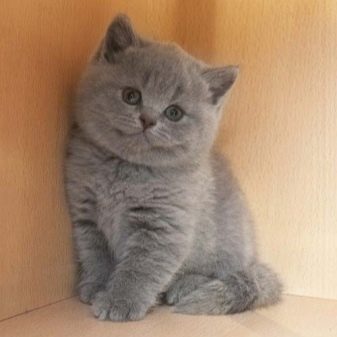
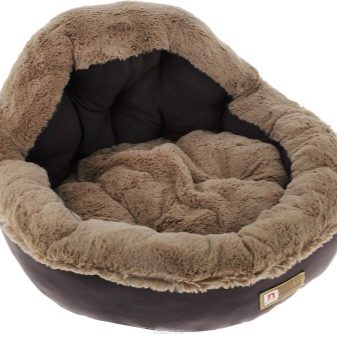
You should not raise your hand to the animal. This method is completely ineffective with British cats.
It is much better to say the word “no” in a strict and confident voice and scold the kitten with the words: “bad”, “disobedient”, “shameless”.
By intonation, the cat will quickly understand that she did something wrong, and will try not to repeat the mistake. Congenital intelligence will not allow the baby to be dirty if he realizes that he has made a mistake.
To cope successfully with the tasks of education, you need to eliminate the "places of temptation" for the animal:
- rearrange the furniture so that the kitten cannot reach the walls and tear the wallpaper;
- block the approaches to the curtains on which he wants to ride;
- put a scratching post in the field of vision of the animal and move it there when it sharpens its claws on furniture;
- sprinkle with a special spray the places where the kitten mistakenly did his "business";
- smear the tips of the leaves with mustard so that the animal no longer eats the plant;
- praise the pet for good behavior, treat it with a treat right away and in the same place in order to consolidate the success.
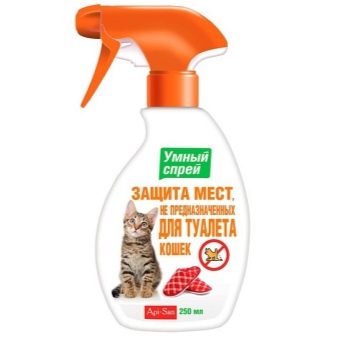
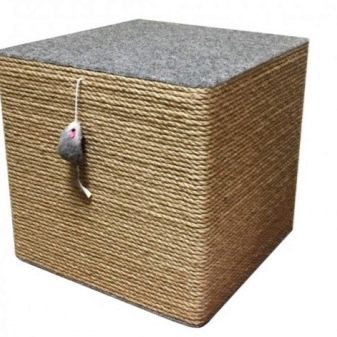
It must be remembered that:
- the British are afraid of noise, so you can't yell at them;
- to beat a cat means to lose her trust and love forever;
- any prohibition - once and for all; the system “today it is possible, but tomorrow it is impossible” is unacceptable;
- do not let loved ones allow the cat to do what you forbid;
- like a small child, a kitten also needs to be given time;
- the cat will grow up kind and obedient if you are patient and attentive to her.
Owner reviews
Reviews of owners of British cats are very different. It's easy to explain: every animal has its own character, and every family has a special life situation. These things greatly influence the behavior and habits of the animal.
Disadvantages.
- The character of the British is "one else": the pussy will not allow to squeeze, crumple, squeeze and stroke, pick it up without her consent. Carrying a British woman in your arms is an insult to her personality.
- Can raise a paw on the owner, but without claws.
- If the cat is unhappy with life - expect trouble. You can find "protest" in your bed, and it will be impossible to do anything about it.
- Picky about food and toilet - the main disadvantages of the animal. These are "masters" to sort out food, bury it and turn away from it until the favorite dish is served.
- These cats are curious, they should be everywhere and everywhere, they like to "misbehave" - throw various objects from tables, shelves, sideboards down and drive them anywhere.
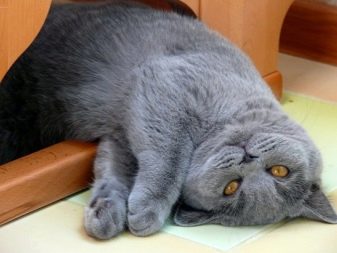

Dignity.
- The British always want to be with their family. To be close to the owner is the main thing for them.They accompany him everywhere, like a faithful dog, and if he leaves, they wait at the door.
- Cheerful and active if desired, they play and communicate with pleasure.
- They do not meow persistently and brazenly. They do not achieve their goal by arranging concerts, they just tactfully remind of themselves.
- Carefully take care of themselves by licking a plush coat.
- Never get in the way or get confusedif the hosts are busy.
- Do not offend children even if they do not have warm feelings for them, but most often they become good friends with them. Affectionate and kind, if they are not imposed by the owners.
If you decide to get a British cat, be patient and sincerely love the animal, then your feelings will be mutual.
See the video about what it's like to live with a British cat in the same house.
